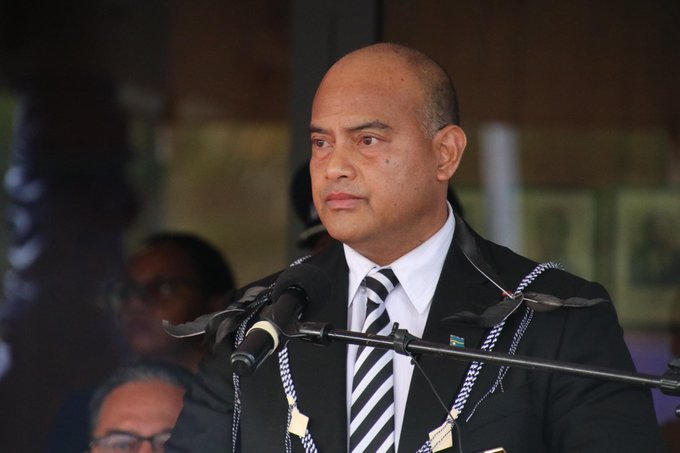Nauru President David Adeang says he hopes Chinese investment “transforms” the tiny island nation after switching recognition from Taiwan.
There is growing influence from Beijing in the Pacific region, and notably Nauru, which under Adeang’s leadership abandoned support for Taiwan in January to formally recognise China.
Adeang on Thursday confirmed that move was to try to attract Chinese investment.
“It has much to contribute to the world and of course to small island developing states. It’s a wonderful opportunity for us to try and transform Nauru with the support of a country as large as China,” he said.
The president’s comments follow New Zealand Deputy Prime Minister Winston Peters’ visit to the Micronesian nation after formal talks concluded on Thursday.
Chinese influence was conspicuously absent during Peters’ whistle-stop tour.
A China flag was taken from outside Nauru’s government offices, and Chinese workers at the port were absent during a brief drive-through tour.
Officials believe Peters is the most senior leader to visit Nauru this century, outside of a Pacific Islands Forum (PIF) summit.
The delegation was also notable as it allowed two journalists to enter the usually-secretive nation.
Nauru has regularly declined visa applications from media over the last decade in an attempt to stymie reporting on the detention facilities.
After the formal bilateral meeting, Adeang took pre-approved questions on his government’s diplomatic switch to end diplomatic recognition of Taiwan, Micronesia’s recent threats to leave PIF and conditions at the detention centre (RPC).
Australia’s offshore detention regime has been lambasted by human rights groups and the United Nations, but was praised by Adeang, who happily gave his “support to keeping Australia’s borders secure”.
Housing the RPC has propped up Nauru’s flailing economy, which once flourished owing to phosphate mining, but now lacks employment opportunities.
“It has done a lot for Nauru. At one stage it cured all of our unemployment issues,” Adeang said, launching an attack on reporting.
“I wouldn’t say that the RPC has brought reputational damage to Nauru. Journalists need to be a bit more fair, a bit more balanced.
“In the hundreds of reports, the possibly thousands of reports, about the RPC, only one has been balanced. I think the problem is not the RPC but it might be the attitude of certain journalists.”
Adeang has reason to be critical of Australian journalism.
Over several years, Nine newspapers have reported on an Australian corruption probe into Adeang, alleging he was bribed by Australian businessman Amit Gupta to secure access to phosphate.
The allegations, substantiated by Australian Federal Police documents, also extend to Baron Waqa, Adeang’s his predecessor as president and now the Pacific Islands Forum secretary general.
Both politicians deny the claims.
Waqa’s ascension to the role of the Pacific’s pre-eminent diplomat appears to have ended a long-running stoush between Micronesia and the rest of the region.
Five nations, including Nauru, threatened to leave PIF after members overlooked a Micronesian candidate for secretary-general, requiring swift patch-up diplomacy from Australia, New Zealand and Fiji.
Adeang said there was a “real risk” to the body in recent years but – using language that would please Australian diplomats – he said PIF remained “pre-eminent in the region and has always been”.
“We’re back,” he said. “We’re grateful for the support of countries in the region … and we look forward to contributing to the Forum at the next meeting in Tonga.”
Canberra and Wellington strongly support PIF as the blue continent’s central Forum as Australia and New Zealand have seats at the table and other powers, such as China do not.














